This website uses cookies
We use cookies to ensure that we give you the best experience on our website. If you continue to use this site we will assume that you are happy with it.
The Immigration Law and Advocacy Clinic recently launched a new initiative called Path2Papers. This timely project helps DACA recipients pursue work visas and other pathways to legal permanent residency. The project focuses on DACA recipients in the California Bay Area and at Cornell and operates in coordination with other Bay Area service providers to support DACA recipients in their path to secure status in the United States.
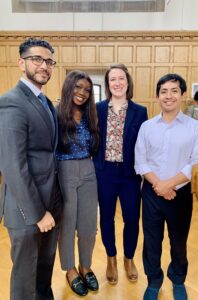
From left: Aziz Ali ’26, Osamede Egharevba ’26, Professor Kelley-Widmer, and Victor Cuicahua, M.S.Ed, Associate Director of Student Empowerment, Undocumented and DACA Student Support.
This semester, the clinic filed six cases for DACA recipients as part of this initiative, and two students delivered a presentation to Cornell faculty and staff about working with undocumented and DACA students.
In March, clinic students participated in a trip to an immigration detention center in Batavia, New York. With partner attorneys from various legal aid agencies, students conducted intakes and Know Your Rights presentations for detained people. A student team also successfully advocated for a client detained in Louisiana, who was recently released from detention. Another student team created pro se handouts to provide detained people with legal information about pathways for release and asylum processes.
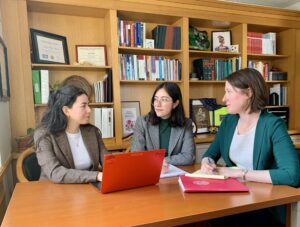
From left: Mimi Goldberg ’24, Sofía Cuevas Dorador ’26, and Clinical Professor of Law Jaclyn Kelley-Widmer secured the release of a rare-language speaker in spring 2024.
The clinic has also been focused on several projects on language access issues in immigration proceedings. Members of the clinic have discovered that many people who speak languages that are unusual in the United States do not receive information in their language while in immigration detention. In addition to winning release for a client who speaks Wolof, the clinic advocated for clients with languages such as Marshallese and Pulaar. Along with its representation of individual clients, a team of students has been working on a project documenting the needs of rare language speakers in Louisiana and crafting legal arguments to improve their access. Finally, the clinic collaborated with the ACLU Immigrants’ Rights project to draft a comment in support of a new rule that would require the asylum office to provide interpreters for affirmative interviews. The clinic drew on its experience representing asylum seekers in their proceedings, for which it had to identify its own interpreters.
Finally, this semester, students worked in teams on defensive asylum cases for local clients. For co-counsel Journey’s End, the clinic produced persuasive briefs in support of its clients and provided detailed country conditions reports to be submitted to the court.
The Asylum and Convention Against Torture Clinic had a productive semester in federal court.
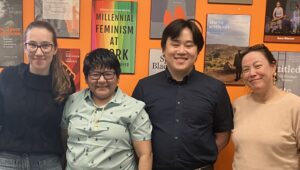
From left: Leila Mosteika ’25, clinic client IHF, Ryan Lee ’25, and Professor Estelle McKee.
The clinic became involved in client IHF’s case in 2020, assisting with her appeal to the Board of Immigration Appeals. The clinic, joined by Prisoners’ Legal Services in New York, then petitioned for review in the Second Circuit, which remanded IHF’s case to the Board, which in turn remanded it to immigration court.
On April 5, the Immigration Judge granted IHF asylum, withholding, and relief under the Convention Against Torture. Multiple students worked on IHF’s case, including Emma Sprotbery ’22, Leila Mosteika ’25, and Ryan Lee ’25. IHF is an LGBTQ+ client who underwent severe persecution in El Salvador, and who has become an advocate in her own right. With Professor Jane Juffer (Feminist, Gender & Sexuality Studies Program, Department of English), IHF’s letters in detention were published in a book, and her art, created while she was in detention, has been displayed in the Johnson Museum.
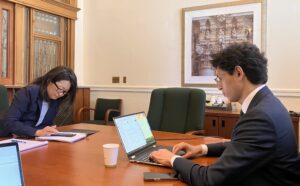
Sahil Patel ’24, right, works with a mediator from the Ninth Circuit on the case of client CML.
In a second case, after briefing by students Christine Brittain ’23, Emily Rivera ’23, and Sahil Patel ’24 in the spring of 2023, client CML’s case was scheduled for oral argument in the Ninth Circuit this semester. One week before oral argument, CML’s criminal convictions were vacated, making him eligible for asylum and withholding. The parties then agreed to mediation in the Ninth Circuit, with Sahil Patel advocating for CML.
On May 6, the government agreed to remand the case to the Board of Immigration Appeals so that CML could seek asylum, withholding, and Convention Against Torture protection.
Client Keisy GM, who was represented by the Legal Aid Society and the clinic, filed a habeas petition after he was detained for almost two years with no bond hearing under 8 U.S.C. § 1226(c), a statute that mandates detention for aggravated felons and others during removal proceedings. GM’s habeas petition was denied and he appealed to the Second Circuit. Students Fei Deng ’22, Jordyn Manly ’22, and Emma Sprotbery ’22 assisted with drafting the opening brief, in which they argued that GM’s prolonged detention was unreasonable and violated due process under the Fifth Amendment.
After oral argument, on May 31, the Second Circuit issued a published decision finding that unreasonably prolonged detention without a bond hearing did indeed violate due process, and that the procedural due-process analysis under Mathew v. Eldridge applied. Because it is not unusual for individuals to be detained under § 1226(c) for lengthy periods, this case will have widespread impact.
The clinic had an active docket this semester, with three oral arguments and an evidentiary hearing conducted, a complaint, several briefs and a motion to quash filed, and prelitigation advocacy, prepublication review, and transactional advice provided for a range of clients.
This spring the clinic won access to records on behalf of news outlet Documented for use in updating its groundbreaking Wage Theft Monitor that tracks New York businesses found guilty of wage theft, which has already spurred legislative action to combat this issue. The clinic previously filed a suit and negotiated with an agency to receive prior tranches of data.
Stanton Fellow Christina Neitzey argued on behalf of a client in May at the New York Court of Appeals in a challenge to a parole condition. Neitzey argued that parole conditions which burden constitutional rights must satisfy heightened constitutional scrutiny, and that a parole condition banning the client from any depiction of nudity or sexual activity violates his First Amendment rights. The clinic expects a decision in the coming months in this case and in a Pennsylvania case argued in February by Connor Flannery ’23. Flannery argued before the Court of Common Pleas on behalf of The Patriot News/PennLive seeking to unseal wrongful death settlement records.
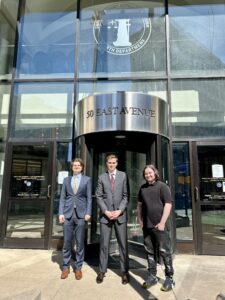
From left: Evan Deakin ’25, Cameron Misner ’24, and their client.
Cameron Misner ’24, argued in April before the Appellate Division, Fourth Department, that clinic clients, who are involved in Central New York’s metal core music scene, should be awarded attorneys’ fees for their defense against a defamation suit seeking to punish them for warning others about a colleague’s alleged sexual misconduct. The court ultimately denied the appeal, but the clinic intends to ask the Court of Appeals to overturn the ruling. And, a month after Misner’s argument, Dominic Muscarella ’24, conducted an evidentiary hearing in a public records case seeking access to a police investigative file.
The clinic also filed a suit seeking access to footage of the arrest of a prosecutor and several briefs during the semester, including four in cases seeking access to public records and a fifth in a retaliation suit. The clinic also filed a motion to quash a subpoena seeking to depose a journalist and unmask his sources.
Finally, the clinic sent demand letters in matters seeking to vindicate a student’s right to not stand for the Pledge of Allegiance and challenging the selective enforcement of a graffiti ordinance and a public official’s censoring of certain viewpoints from his Facebook page.
In May, the Gender Justice Clinic obtained temporary protected status for a feminist activist who fled from threats and violence in her home country. Clinic students have applied for similar relief for five other clients, and those applications are pending.
In June and July, Professor Elizabeth Brundige will reprise her interactive online course on human rights for undergraduate and advanced high school students. Meanwhile, five students who previously participated in Brundige’s college-level courses have joined the Gender Justice Clinic as part-time summer research assistants. One of these students, Greta Garrison, a senior at Charles O. Dickerson High School in Trumansburg, recently shared some thoughts about her experience with the course and work with the clinic.
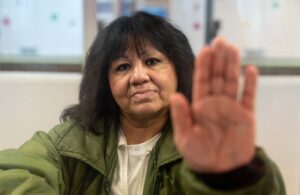
Melissa Lucio.
International Human Rights Clinic client Melissa Lucio is one step closer to release after spending sixteen years on death row. In April 2024, Texas judge Arturo Nelson recommended that her conviction and death sentence be vacated. Earlier, both the district attorney and the defense team (which includes the Innocence Project, the Texas Federal Defender’s Capital Habeas Unit, and Clinical Professor Sandra Babcock) had jointly asked the court to find that the state had withheld exculpatory evidence during Lucio’s 2008 capital murder trial. The case is now with the Texas Court of Criminal Appeals.
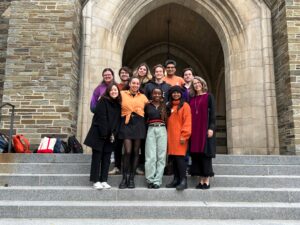
The 2023–24 International Human Rights Clinic.
Over the last year, the clinic has also been actively assisting the courageous lawyers fighting to overturn Uganda’s Anti-Homosexuality Act, which makes consensual, same-sex sexual acts punishable by life imprisonment or death. Last year, the clinic helped Ugandan lawyers develop international human rights arguments challenging the act. After traveling to Kampala in fall 2023, students prepared submissions to U.N. experts demonstrating the harm caused by the law on the LGBTQI community and their allies.
In April 2024, Babcock received a Community-Engaged Practice and Innovation Award from the Einhorn Center for Community Engagement. The awards, given annually to one person from each of the university’s colleges and schools, recognize faculty who have recently developed community-engaged learning, leadership, or research activities that create curricular and co-curricular opportunities for students. Babcock also published “The Lethal Consequences of Gender Bias in the Application of the Death Penalty,” 45 Amicus Journal 4 (2024).
The Cornell Center on the Death Penalty Worldwide recently received a grant from the German Ministry of Foreign Affairs to support incarcerated women and their lawyers. The center will be collaborating with the Lone Star Justice Alliance to develop a guide for incarcerated survivors of gender-based violence and human trafficking who are eligible for clemency. The center will simultaneously develop trainings for attorneys defending women and transgender persons around the country.
In June 2024, Bahar Mirhosseni (the center’s director of legal advocacy), Chelsea Halstead (director), and Sandra Babcock (faculty director) published an op-ed in Teen Vogue about the “silent crisis” of incarcerated women in the United States.
Three law classes and two debate clubs successfully completed their semesters at Five Points Correctional Facility, Auburn Correctional Facility, and Cayuga Correctional Facility this spring. Nine law students taught classes such as contracts, constitutional law, and supreme court cases and ran two debate clubs, teaching more than thirty incarcerated students enrolled in the Cornell Prison Education Program (CPEP).
In May, CPEP organized two exciting events at Cayuga Correctional Facility. On May 9, the Cayuga CPEP Debate Team formally competed against the Cornell Speech and Debate Team. The CPEP Debate Team was taught and coached by three law students; Josh Roth ’24 and Daniel Imakyure ’24 taught oral argument in fall 2023, and Sarah Stevenson-Peck ’25 facilitated the Debate Club in spring 2024. The debate topic was whether Artificial Intelligence will do more harm than good. Three CPEP debate team members competed against three Cornell Speech and Debate Team members. There were formal opening arguments, three main arguments, challenges, rebuttals, and closing arguments. The CPEP Debate Team argued that AI will do more harm to society than good due to existential threats such as its environmental impact, its ability to cause disinformation in society, and the likelihood that it will increase wealth inequality. The CPEP Debate Team won!

Josh Roth ’24, second from left, attended graduation at the Cayuga Correctional Facility.
Thirteen CPEP students at Cayuga Correctional Facility also graduated with their associate in arts degrees in humanities and social science on May 17. Two of the CPEP students who competed on the debate team graduated, and both were commencement speakers. Roth also attended the graduation wearing his own regalia from Cornell Law School Convocation.
Students in the Veterans Law Practicum recently secured two remand decisions from the Court of Appeals for Veterans Claims, a federal appellate court, on service-connected disability compensation claims before the Veterans Administration. In the first case, an Army veteran who served twenty years, often in highly classified assignments, was denied disability compensation due to the VA’s failure to obtain classified personnel records. In the second case, an Army veteran was denied disability compensation for skin cancer based on an inadequate VA medical examination. Both cases were remanded for further adjudication based on these errors.
The practicum also joined an amicus brief before the Supreme Court of the United States in support of unhoused veterans in the case of City of Grants Pass v. Johnson, which heard oral arguments in April 2024. The court must decide whether the enforcement of municipal ordinances regulating camping on public property constitutes “cruel and unusual punishment” prohibited by the Eighth Amendment. Such local ordinances effectively criminalize homelessness and are extremely harmful to unhoused individuals. The practicum joined a coalition of legal aid organizations and veterans law clinics in support of unhoused veterans across the country.
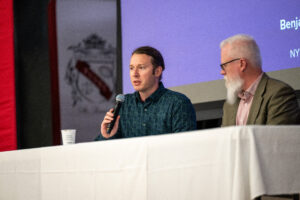
James Hardwick (left).
Adjunct Professor James Hardwick participated as a panelist and moderator at the New York State Department of Veterans Services DEI conference held in New York City and Albany in April. Hardwick moderated a panel discussion addressing advocacy for women veterans and served as a panelist in a discussion on building allyship among various stakeholders in the veterans advocacy community. He spoke to the unique role held by law school clinics in preparing new attorneys to accept pro bono veterans cases.
The practicum also hosted Patrick George ’24 as a Pro Bono Scholar in the spring. George worked on several matters, including an application for discharge status upgrade for a young Black veteran at risk of homelessness as well as assisting on a federal appeal of a medical retirement discharge upgrade before the U.S. Court of Federal Claims for an at-risk trans Black veteran.
Over the summer, the practicum will host three summer interns, Jared Feltman ’25, Aziz Ali ’26, and Michael Ahn ’26, who are currently working on appeals and discharge upgrade applications before the Court of Appeals for Veterans Claims.
Hardwick was also recently awarded the Evan Seamone Social Justice Award by the National Law School Veterans Clinic Consortium in recognition of his work establishing the Veterans Law Practicum at Cornell Law School.